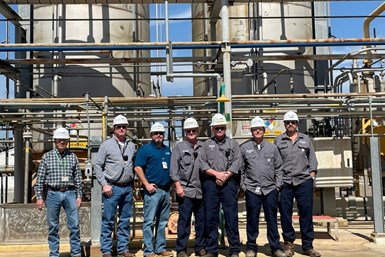BASF Receives PEP Environmental Stewardship Award
This award honors BASF for its stewardship and aims to inspire more businesses to be environmentally conscious and responsible.
Partners for Environmental Progress (PEP) has awarded a BASF facility a 2022 Environmental Stewardship Award for the production of light stabilizers and work to improve the durability of plastics and coatings for automotive and construction materials applications. The facility honored is located in McIntosh, Alabama.
Through BASF’s site waste minimization program, the McIntosh team continuously evaluates all waste streams to identify opportunities to reduce the quantity and improve sustainability in the disposal. In 2020, the team proposed using the t-butanol (TBOH) waste stream as a comparable fuel for the hazardous waste boiler at the site. Team members from operations, technology, utilities, safety, analytical services and logistics supported the project.
“We are honored to receive a PEP Environmental Stewardship Award,” says Marcus Pezent, site director for the BASF McIntosh facility. “At BASF McIntosh, we commit to being responsible stewards daily for our organization, employees and the community by ensuring environmental safety.”
Throughout 2021, a total of 1.9 million pounds of recovered TBOH was transferred from light stabilizers to utilities as boiler fuel. This eliminated the shipment of 50 tanker truckloads of hazardous waste material for offsite disposal. Using the recovered TBOH as fuel on-site, BASF’s McIntosh facility reduced its greenhouse gas (GHG) emissions from transportation by 35 metric tons of CO2 (based on the Environmental Defense Fund’s Green Freight Handbook).
The company says climate protection is a key pillar in BASF’s sustainability efforts, and the McIntosh site aims to achieve net zero CO2 emissions by 2050 and reduce its absolute CO2 emissions by 25 percent by 2030. To support these goals, the BASF team is continuously identifying projects to improve processes and minimize waste.
Related Content
-
Surface Prep Solution for Rusted Rebar in Concrete
Julie Holmquist of Cortec Corporation discusses passivating corrosion on rebar and other reinforcing metals.
-
Concrete Reinforced Bars Built to Last
Not all corrosion-resistant materials for infrastructure are created equally. Epoxy-coated steel rebar has advantages that other materials used to prevent corrosion do not.
-
Quick Turnaround is Key for Architectural Coating Shop
This California metal fabricator and coater focuses on fast turnaround and streamlining its processes with 40 years of experience in the construction industry.















.jpg;maxWidth=300;quality=90)
